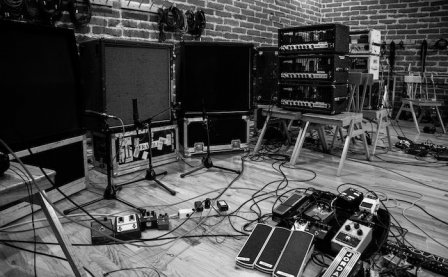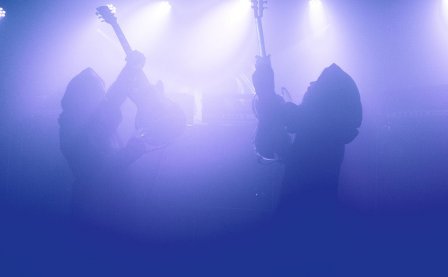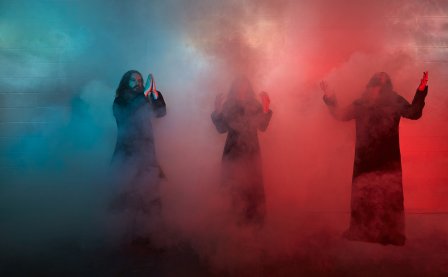Lyrically exploring existential angst is sailing between Scylla and Charybdis. Scylla, cliff-dwelling monster, threatens with melodrama and needless strife, while the maelstrom Charybdis draws the ship to an empty point at its center, hollowing out claims by showing the emptiness at the core of pure metaphysical speculation presented as lyrics. Like Odysseus, Joel Phelps of Dama/Libra chooses to steer closer to the rocks. On Claw, Phelps, briefly part of seminal indie rock band Silkworm, combines his dramatic, angst-ridden vocals with bass and organ drones, steel drums, and spare piano and percussion, the heaviest of these courtesy of Stuart Dahlquist, formerly of Goatsnake and sunn O))) (now Asva). Although the duo traverses plenty of unique territory, finding a few gorgeous harmonies between Phelps’ powerful voice and Dahlquist’s endless bass sustain, Claw often lapses into overwrought tenderness, its delicate, mostly minimal arrangements too fragile to carry the weight.
“To suffer/ I would look up” resounds Phelps on “Stravinsky.” The line implies that the speaker might wish to suffer, which is perhaps not implausible, if a bit histrionic; but it continues to reveal that the source of this suffering would come from above, from the heavens, where a god or its absence might reside. Phelps begins the song with reassurances: “I will be brave… I will be strong.” Yet the fear of what this being in the sky (or lack thereof; or whatever else the speaker may be looking up at: a storm, another person’s face, etc.) means to this person seems to utterly negate these reassurances, which already have the well-intentioned but empty character of advice we offer those in states of emotional rawness. Not only do we witness this vulnerability in the speaker’s struggle for power against his fear, but we also hear how fruitless this struggle has been and how immaterial the adversary is. Imagine how dismal the situation would have been if Don Quixote knew the windmills were windmills.
Sometimes Phelps fills space within the spare lyrics through repetition, especially on “Been To The Water,” where he repeatedly announces he’s “never before been to the water.” Water, which cleanses both physically and spiritually, is generally accessible to us all, even metaphorically. While the repetition of this line and the subsequent transformation of the track from ambient tones to steel drum rhythms suggest that perhaps the speaker has found the water, finally, and only wants to show how wonderful he finds it, the line itself contains no new content. Even if this shift has occurred, Phelps is spending his time in nostalgia, with his never having gone. Thus, the speaker never seems to arrive, steel drums notwithstanding, and yet the climax of the song brims with sugary celebration. Of what? The brightest moments of Claw share the schmaltz of the gloomy sections. Its contentless existential anxiety pervades the album. Despite all the doom, much of Claw is often weightless.
Where Dahlquist’s immense bass drones do sometimes lend heaviness to the moody lyrics, Claw feels most coherent. Single “The Chant” and the middle section of “Thine” embrace this union most effectively, the minimal but vast music joining with the most powerful portions of the lyrics. However, in other areas, the intensity of the music feels inappropriate to the content of the song. Take “Only Medicine,” which ends with a stomping, metallic breakdown after lyrics that contain the words “It’s only medicine, my love.” The tenderness of that moment hardly justifies the crunchy riff that follows, and that riff itself feels undercooked, tacked on as a bridge before the final, heavy drone rings out.
None of this is to suggest that existential angst is always fruitless; psych-rock provides many excellent successes. But instead of representing an altered state, happy or horrific, Claw feels more like a portrait of dysthymia, its not-quite-cosmic speculations keeping itself awake deep into the night. So instead of sublimity, we hear molehills blown up into mountains, morose dwelling in minor sorrows (unlike black metal, where its deepest sorrows reach into the abyss). And when we see the light, we experience slight joy without ecstasy. Claw may be a raw document of a certain form of angst, but it fails to communicate the colossal profundity of the cosmic gulf or the identity-shearing scission that this state can command. Claw’s subtle masochism and tender emotion show us a silence that’s felt more as a conspicuous lack than a vast emptiness.
More about: Asva, Dama/Libra, Silkworm, Sunn O)))




